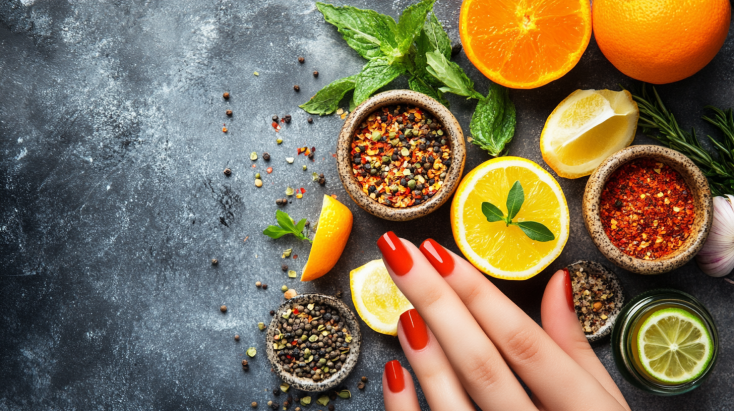Your Nails and Nutrient Deficiency: Here’s What You Need to Know

Ever stared at your nails and wondered why they look the way they do? Your nails can actually tell you a lot about your health. From brittle tips to unusual spots, your nails might be trying to tell you that your body is missing something essential. Let’s crack the code and see what those signs might mean.
The Basics of Nail Health
Nails are more than just a canvas for your favorite polish. They’re made of keratin, a protein that also forms your hair and skin. Healthy nails should be smooth, strong, and uniform in color. When something’s off, they might become brittle, discolored, or develop ridges. Often, nutrient deficiencies are to blame.
Why Are Nutrients Important for Nail Health?
Vitamins and minerals play crucial roles in maintaining nail health. They help in cell growth, repair, and overall strength. When your body lacks essential nutrients, your nails can suffer, becoming weak or showing visible signs of distress.
Common Nutrient Deficiencies and Their Nail Symptoms
Iron Deficiency
Iron is vital for producing hemoglobin, which carries oxygen to your cells. Without enough iron, your nails can become thin and concave, a condition known as koilonychia or “spoon nails.”
Biotin Deficiency
Biotin, also known as Vitamin B7, is famous for promoting healthy hair and nails. A lack of biotin can lead to brittle, splitting nails that break easily.
Zinc Deficiency
Zinc supports cell growth and repair. Insufficient zinc can cause white spots on your nails, a condition called leukonychia.
Protein Deficiency
Proteins are the building blocks of nails. Without enough protein, your nails can become weak and fragile, breaking easily.
How to Identify Nutrient Deficiencies Through Your Nails
Ridges and Lines
Vertical ridges are common and often harmless. Horizontal lines, called Beau’s lines, can indicate a severe illness or nutritional deficiency.
Discoloration
Yellow nails can signal a vitamin E deficiency, while white spots often point to a lack of zinc or calcium.
Brittle Nails
If your nails easily chip or break, you might need more iron, biotin, or protein in your diet.
Foods to Boost Nail Health

Iron-Rich Foods
Include red meat, spinach, and lentils in your diet to boost your iron levels. These foods help produce hemoglobin and keep your nails strong.
Biotin-Rich Foods
Eggs, nuts, and seeds are excellent sources of biotin, promoting stronger, healthier nails.
Zinc-Rich Foods
Incorporate shellfish, beans, and whole grains into your meals to ensure adequate zinc intake, supporting nail growth and repair.
Supplements for Stronger Nails
If you can’t get enough nutrients from food alone, consider taking supplements. Biotin, iron, and zinc supplements can help fill the gaps in your diet and improve nail health.
Hydration and Nail Health
Water is often overlooked, but staying hydrated is crucial for nail health. Dehydration can make your nails brittle and prone to breaking.
Avoiding Nail Damage
Limit Exposure to Harsh Chemicals
Chemicals in nail polish remover and cleaning products can weaken your nails. Opt for gentler alternatives whenever possible.
Wear Gloves
Protect your nails by wearing gloves when doing household chores or gardening. This reduces exposure to chemicals and physical stress.
Moisturize Regularly
Use hand and nail creams to keep your nails hydrated and prevent them from becoming dry and brittle.
DIY Nail Care Tips
Regular Trimming
Keep your nails neatly trimmed to prevent them from breaking and snagging on objects.
Gentle Filing
When filing your nails, use a fine-grit file and move in one direction to avoid causing splits and tears.
Cuticle Care
Gently push back your cuticles after a shower when they’re soft. Avoid cutting them, as this can lead to infections.
Professional Nail Treatments
If you’re struggling with persistent nail issues, consider seeking professional help. Dermatologists and nail technicians can provide treatments and advice tailored to your needs.
The Role of Genetics in Nail Health
Sometimes, nail issues are hereditary. If you’ve inherited weak nails, focus on maintaining a nutrient-rich diet and proper nail care to minimize damage.
Conclusion
Your nails are more than just a fashion statement—they’re a window into your overall health. By paying attention to the signs and ensuring your body gets the nutrients it needs, you can keep your nails strong and beautiful. Remember, it’s not just about what you put on your nails but also about what you put in your body.
Follow us for more secret tips on maintaining a healthy nail and stylish life, and don’t forget to share your nail care stories with our community!
FAQs
How often should I trim my nails?
Trim your nails every two to three weeks to keep them healthy and prevent breakage.
Can stress affect my nail health?
Yes, stress can impact nail growth and lead to conditions like Beau’s lines. Managing stress is essential for overall nail health.
Are there any specific vitamins for nail health?
Biotin, iron, zinc, and vitamin E are crucial for maintaining healthy nails. Ensure your diet includes these nutrients or consider supplements.
Can nail polish affect my nail health?
Frequent use of nail polish and harsh removers can weaken your nails. Give your nails a break occasionally to allow them to breathe and recover.
How long does it take to see improvements in nail health after changing my diet?
It can take several months to see significant improvements, as nails grow slowly. Consistency is key to achieving and maintaining healthy nails.
















